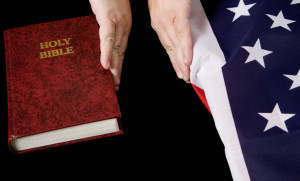You’d almost have to be living under a rock not to have heard about Kim Davis and the battle in Kentucky over gay marriage. Although Davis is getting most of the news coverage in the fight between faith and government, that story is not the only one playing out in the nation. Several judges and civic leaders have brought religion into their state-sponsored jobs and forced others to live by their rules.
Christian Counseling or Losing Your Kids
Holly Salzman, an Albuquerque woman who was attempting to co-parent with her ex-spouse, was sent to a counselor named Mary Pepper. The first session opened with a prayer. Although Salzman informed Pepper that she was not religious, Pepper continued the Christian theme during the session. When Salzman stopped attending the sessions, the court took away her children and told her that she could have them back when she finished the sessions.
Salzman was completely willing to attend counseling with her ex; she even paid for the sessions. What she objected to was the religious basis. She went on to finish the sessions and got her sons back; however, the price she paid was a violation of her rights. The counseling sessions did not help her co-parent with her ex, but merely wasted her time. Sadly, Salzman is not alone.
Judge’s Ruling With Religious Undertones
In 2012, an Oklahoma woman was denied the opportunity to change her name. This is something that is perfectly legal in Oklahoma when handled by the rules, but the judge denied her case because she was transgender. Under his beliefs from the Bible, God meant for individuals to stay male and female. However, in Oklahoma, the only reason that a name change can be denied is for fraudulent or illegal activity.
A judge in Houston gave nine defendants the punishment of reading The Heart of the Problem, a Christian workbook for living victoriously. Instead of community service, each defendant would have to return to the court and discuss the book with the judge. The ACLU believed the judge’s actions were patently illegal. The judge believed that he was trying to find an alternative method to get “criminals” on the right track. He has stopped offering the option.
What Happened to the First Amendment?
America has worked hard for the separation of church and state. School children learn the concept in middle school, but that hasn’t stopped the judicial system from interjecting their own beliefs into rulings from the bench. Although many Christians base their moral and ethical judgments on the Bible, does that mean they can circumvent the law?
These cases may seem like miles away from where you live, but it’s up to each individual to stay diligent about what’s going on in his or her community. The ACLU is there to fight for the rights of people, both religious and non-religious, but they need the support of the community. There have even been a lot of jokes about civic leaders who won’t do their jobs because of religious beliefs, such as a Quaker who won’t issue a gun permit because he or she believes in peace.
People have to get serious about diversity. Judges should know that more than anyone else, but this doesn’t always seem to be the case. Instead of shouting out a message against it:
- Use empathy to help those who don’t get the idea.
- If they are Christian, ask them how would they feel if they had to attend a mosque to get a job.
- Do not force religion on anyone else.
Know what’s going on in your community. Get involved so First Amendment rights of others aren’t violated. Let civic leaders and judges know that you are paying attention to their decisions. It’s baffling that educated judges with years of experience in the legal industry haven’t figured out where the line is between separation of church and state.


